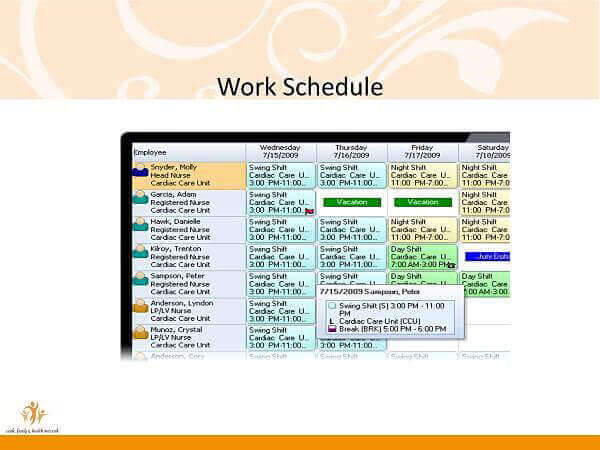May 16, 2019
A work patch for better nursing home care
 A research team, including a Purdue University work-life balance expert, studied work schedules in nursing home facilities. (Stock photo)
Download image
A research team, including a Purdue University work-life balance expert, studied work schedules in nursing home facilities. (Stock photo)
Download image
Improved scheduling approaches could improve life in nursing homes for patients and staff
WEST LAFAYETTE, Ind. - Placing a loved one in a nursing home can be a traumatic experience for the entire family with concerns about the care and attention they will receive. Imagine if those concerns were eased, simply by some changes in the way the schedules are done for the staff at that facility.
“The work schedules for employees in these highly stressful jobs can have a significant impact ultimately on the care patients receive,” said Ellen Ernst Kossek, the Basil S. Turner Professor at Purdue University’s Krannert School of Management and research director of Purdue’s Susan Bulkeley Butler Center for Leadership Excellence. “Organizations should strive to do a better job in taking into account the needs of workers when creating schedules, which will lead to less stress, better patient care and less turnover.”
Kossek and her co-authors including Purdue Krannert School of Management doctoral student Lindsay Mechem Rosokha and Carrie Leana, the George Love Professor of Organizations and Management at the University of Pittsburgh, examined work-life balance issues and schedules for eight nursing home facilities in the United States. Their work appears online in Work and Occupations. The study was partially funded by the U.S. National Institutes of Health as part of the Work, Family and Health Network Study.
They found three main ways that the facilities approached worker scheduling. In the “Sharing the Pain” method, the organization randomly assigned schedules without regard to merit or length of employment. The “Reverse Status Rotation” method involved a scheduling approach where first-line managers were required to fill in for their direct reports who unexpectedly missed part or all of their shifts. For the “Work-Life Needs” method, the organizations took a more improvised approach and experimented with different ways to fill in schedules to balance the needs of the workers with patient coverage.
 Based on research, a work schedule patching approach, where ongoing adjustments are made to plug scheduling holes after schedules are posted, could benefit nursing home facilities. (Image provided)
Download image
Based on research, a work schedule patching approach, where ongoing adjustments are made to plug scheduling holes after schedules are posted, could benefit nursing home facilities. (Image provided)
Download image
“This last method may produce the best results for workers, the facility and the patients,” Kossek said. “Based on this, we suggest that work schedule patching approaches, which are the ongoing adjustments made to plug scheduling holes after schedules are posted, take into account how to effectively manage last minutes schedule changes on the ground in ways that support employee’s work-life scheduling by motivating coverage by co-workers who would like to work the schedule, instead of the first approaches which just force others to cover.”
Kossek said the research suggested that similar approaches could work well for not just health care, but many industries with scheduled hourly workers ranging from retail, childcare, manufacturing, to police and security.
Kossek said an initial analysis of the data from their study also showed a suggestive link between better work-life scheduling in nursing home facilities and fewer pressure ulcers in patients.
“Pressure ulcers can develop from patients not being moved often, just staying in the same position in bed, or not keeping the skin clean and dry.” Kossek said. “It seems from the research that employees with better scheduling options are able to experience less strain and be able to be more focused on patient care.”
Kossek has received worldwide attention for her research on work-life balance and has
worked with the Purdue Research Foundation on some of her studies.
The team’s work aligns with Purdue's Giant Leaps celebration, celebrating the global advancements in health as part of Purdue’s 150th anniversary. It is one of the four themes of the yearlong celebration’s Ideas Festival, designed to showcase Purdue as an intellectual center solving real-world issues.
About Purdue Research Foundation
The Purdue Research Foundation is a private, nonprofit foundation created to advance the mission of Purdue University. Established in 1930, the foundation accepts gifts; administers trusts; funds scholarships and grants; acquires property; protects Purdue's intellectual property; and promotes entrepreneurial activities on behalf of Purdue. The foundation manages the Purdue Foundry, Purdue Office of Technology Commercialization, Purdue Research Park and Purdue Technology Centers. The foundation received the 2016 Innovation and Economic Prosperity Universities Award for Innovation from the Association of Public and Land-grant Universities. For more information about funding and investment opportunities in startups based on a Purdue innovation, contact the Purdue Foundry at foundry@prf.org.
Writer: Chris Adam, 765-588-3341, cladam@prf.org
Source: Ellen Ernst Kossek, ekossek@purdue.edu
Abstract
Work Schedule Patching in Health Care: Exploring Implementation Approaches
Ellen Ernst Kossek, Lindsay Mechem Rosokha, Carrie Leana
The authors propose a typology of “work schedule patching,” the ongoing adjustments made to plug scheduling holes after employers post schedules. Patching occurs due to changes in employer work demands, or employee nonwork demands necessitating scheduling adjustments, which are reactive or proactive. Using qualitative data from eight health-care facilities, the authors identified three narratives justifying schedule patching implementation approaches (share-the-pain, work-life-needs, and reverse-status-rotation) with variation in formalization and improvisation. Exploratory analysis showed a suggestive link between improvised work–life scheduling and lower pressure ulcers. This article advances theory on balancing the “service triangle” of scheduling in-service economies including health care.

